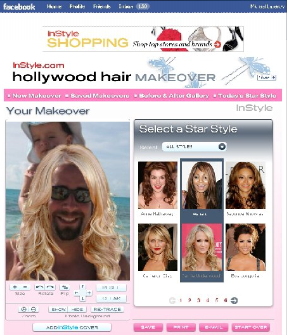To Mike Lazerow, CEO of new-age ad agency BuddyMedia, Facebook is the future. Big brands trying to reach the world’s 500,000,000 social network members are ringing his phone off the hook, because his firm has the skills to create branded apps — what he calls ‘the new ad unit.’ But what might they bode for us ‘pureplay’ app developers?
For most, not good. First of all, BuddyMedia, Context Optional, and a few others are blazing this trail because traditional ads — display and links — don’t work, which is why (as we all know) there’s beaucoup excess inventory and CPMs are in the crapper. Second, consider this: branded apps are all about engaging users, and those 250,000 active users playing Rundezvous (the game BuddyMedia built on behalf of New Balance) are, uh, not on your app.
Third, what they’re doing contributes more to the overall signal-to-noise problem than you might expect. Not so much that they’re adding to the 32,000+ Facebook apps anywhere near what 400,000+ registered developers are piling on each day, but because each branded app media program includes buying engagement — Lazerow averages $1/user to get them to show up. (Oh, you hadn’t planned on spending $100k to seed your app?)
Finally, it stands to reason that these guys will get better at what they do. Since Rundezvous players earn ‘AceBucks’ redeemable for actual (not virtual) running shoes, a whopping 57% of users came back at least nine times. BuddyMedia developed a Facebook version of InStyle magazine’s Hollywood Hair Makeover — an app that lets you swap your face with a celebrity’s, so you can see how you’d look in their hairstyle — which had negligible traffic on InStyle’s website.

At O’Reilly’s Web 2.0 Expo in New York this week, Lazerow provided Makeover’s latest Facebook stats:
➢ 185,000 installs in 6 weeks
➢ average time on app: almost 7 minutes
➢ 47% of total user base has returned to the app more than 25 times
➢ the average user tried 3 hairstyles
Some pretty decent numbers. And, unlike traditional ad campaigns, this one hints at something that just could be perennial. (Women were even printing out the results and taking them to their hairdressers.) Dang, if there were a second-order viral component to it (more than than just telling your friends), it could kill.
So what’s a social app developer to do?
Well, it still starts with building a great app with true viral attributes, getting it up, testing, tweaking — nothing’s changed there. But if it’s revenue you’re after (duh), time for some new creative thinking. We’re working several angles for our startup, CHALLENJ, a social gaming utility (under construction). Here are two — maybe one fits what you’ve got.
1. Can’t beat ’em, join ’em. If you’ve got a themed game, why not pull a BuddyMedia? Get your own advertiser, and turn it into a branded app. (Try to think of it as a sponsorship . . . rather than selling out.) This, of course, would be easier if you’ve already launched and are putting up some respectable numbers.
2. Market your engine. Less applicable to most maybe, but what we’re working on is something has some underlying functionality that’s not only useful for us, but would be useful to BuddyMedia and their ilk. Without going into detail, it’s analogous to, say, a polling app, or better yet, the functionality of social-debate platform CreateDebate.
Where there’s a will, there’s a way. At the Social Gaming Summit in San Francisco this past June, Acclaim Games‘ Chief Creative Officer Dave Perry cited 29 business models for games.
There is still success to be had — and money to be made — if you’re creative. Time is not on our side, however. With apps that enable non-programmers to build apps now emerging — lolapps recently raised $4.5M to do just that — it’s only going to get noisier out there.
